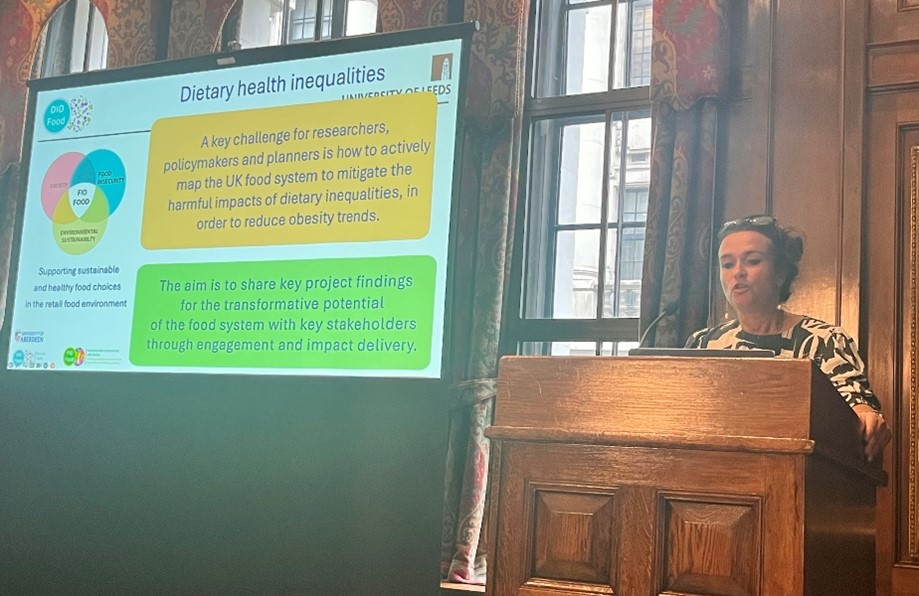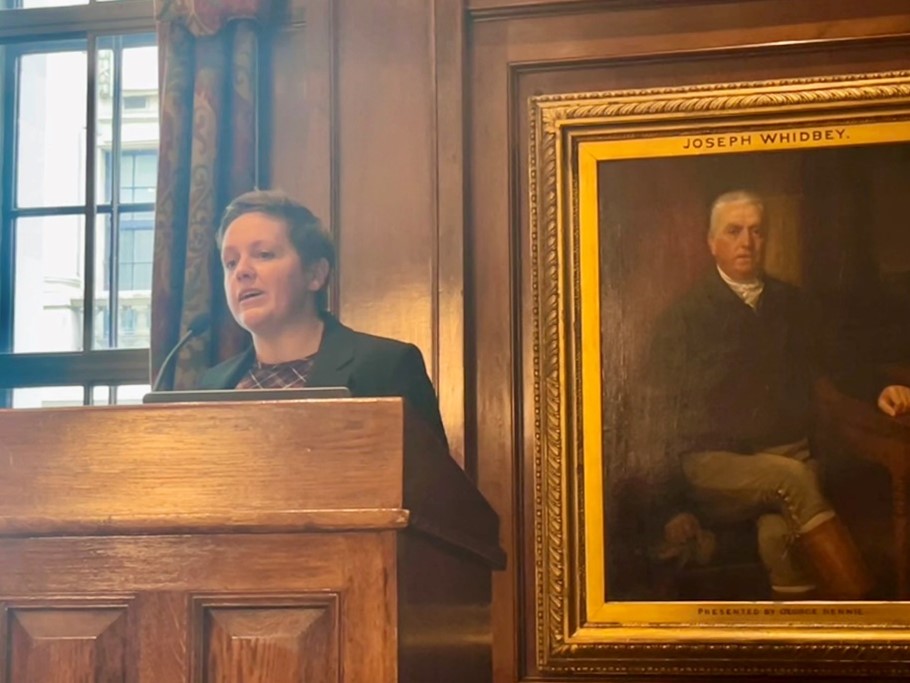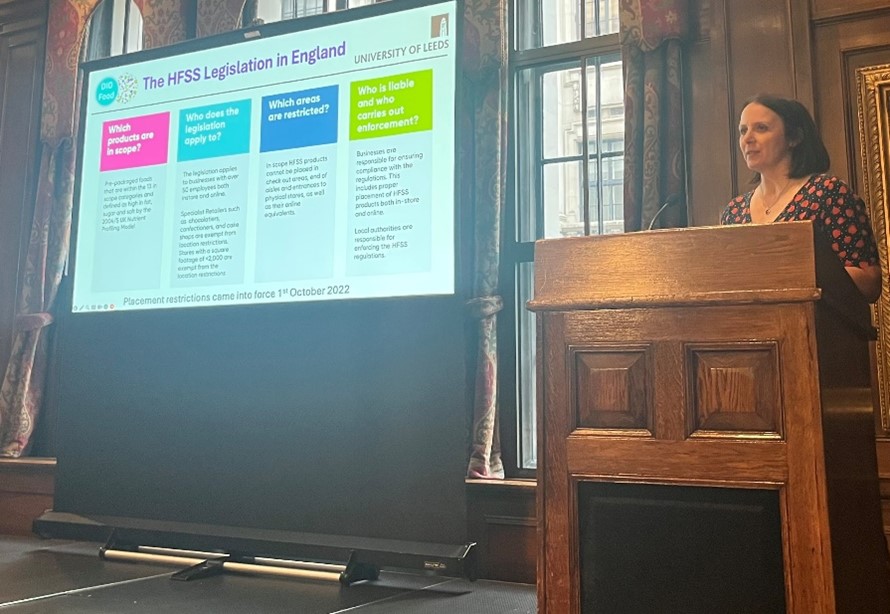I was delighted to receive an invitation to the Westminster reception, Insights from the HFSS Policy Evaluation, held on 3 September 2025. The event presented exciting findings from the High Fat, Salt and Sugar (HFSS) research, part of the DIO (Diet and Health Inequalities) Food project, funded through the Transforming the UK Food System for Healthy People and a Healthy Environment programme (UKRI, Global Food Security, BBSRC, ESRC, MRC, NERC, Defra, DHSC, Innovate UK and FSA).
This project evaluates how restrictions on promoting less healthy foods in retail environments can reduce diet-related health inequalities, especially during the cost-of-living crisis, when healthier options are often less affordable.
Unhealthy diets contribute to lower life expectancy and higher risk of obesity, heart disease, type 2 diabetes, and certain cancers. The HFSS legislation, introduced in England in October 2022, limits how foods high in fat, sugar and salt can be promoted in shops and online.
Beginning in 2023, researchers from the Consumer Data Research Centre (CDRC) led by Professor Michelle Morris (University of Leeds) analysed supermarket transaction data to assess the law’s impact on purchasing behaviour. Using data from major UK retailers, the team examined over two and a half years of sales to see how customers responded to the changes. Surveys and interviews with retailers, stakeholders, and customers provided further insight.
At the University of Aberdeen, Professor Alex Johnstone led the Diet and Health Inequalities (DIO Food) project, aligned with Food Insecurity in People Living with Obesity (FIO Food). Together, these projects aim to generate timely, evidence-based recommendations to help policymakers support healthier and more sustainable diets.
The Westminster Event
The reception brought together parliamentarians, researchers, retailers, and health professionals to discuss the early results from England’s HFSS legislation, how it affects customer behaviour, retail performance, and social equity.
Alex Johnstone opened the event, explaining how the DIO Food project provides evidence to inform policy decisions on dietary health inequalities. She directed attendees to the project website for the latest policy brief (September 2025).

Alex Johnstone welcoming us and describing dietary health inequalities. Source: Lorna Dawson
Kirsty Blackman, MP spoke about the vital policy context, thanking scientists for their work. She recalled her time as a councillor in Woodside, Aberdeen, where residents had limited access to fresh food and transport, highlighting how diet inequality is rooted in infrastructure and opportunity. She looked forward to seeing the findings from England applied in Scotland.

Kirsty Blackman MP opening the event. Source: Lorna Dawson
Key Findings
Professor Michelle Morris presented the results from analysis of sales data across Morrisons, Sainsbury’s, Asda, and Tesco. The study combined retailer data with surveys of nearly 2,000 shoppers to assess both behavioural and attitudinal change.
Among those surveyed, 92.5% reported buying from at least one HFSS-dominated category weekly, and 73% believed the new legislation would not change their habits. Shoppers with children were most likely to buy products positioned at store entrances, emphasising the power of placement.

Michelle Morris presenting the results of the DIO Food study. Source: Lorna Dawson
At store level, the introduction of HFSS restrictions led to a 0.63 percentage-point reduction in proportional sales of HFSS products by weight, equating to around 3 million fewer HFSS items sold per day across eligible English stores. Retailers adapted quickly, moving non-HFSS items to prime shelf space, reformulating products, and using digital advertising to replace in-aisle promotions.
Customer feedback showed that 77% believed government has a responsibility to support healthy eating, and 90% said affordability of healthy food is as important, or more so, than restricting unhealthy products.
Panel Discussion
A panel chaired by Professor Alex Johnstone included Dr Alison Fildes (University of Leeds) and Hannah Daley (Institute of Grocery Distribution – IGD). Questions from the audience sparked lively discussion on consumer behaviour, retail compliance, and data transparency.
When asked which foods were replacing restricted HFSS products, Michelle Morris noted this would be the next research focus. On inequalities, she explained that store-level data currently limit insights into who benefits most, but future loyalty data could help fill this gap.
The panel discussed whether positive impacts might diminish over time or be undermined by “loopholes”, for instance, reducing store floor area to avoid classification. Retailers were adapting differently: some exceeded legal requirements, while others hesitated without firmer guidance.

The panel of speakers during the Q&A session, described as excellent “girl power” by Kirsty Blackman. Source: Lorna Dawson
Dr Fildes emphasised that “the food environment is incredibly complex” and highlighted the need for ongoing collaboration between retailers, government, and researchers. Both she and Michelle Morris agreed that making fresh produce more affordable and accessible remains essential.
On Scotland’s next steps, Alex Johnstone said: “We want to see evidence informing policy. The legislation isn’t yet in place here, but we’re already in discussions with policy colleagues to ensure lessons from England shape a healthier food environment in Scotland.”

A very engaged and interactive audience at the HFSS policy evaluation event. Source: Lorna Dawson
Recommendations and Reflections
The HFSS evaluation, a collaboration between the University of Leeds, University of Aberdeen, IGD, and four major retailers, forms part of England’s Childhood Obesity Strategy. The report explores how policy can reshape retail spaces to support public health and identifies lessons for the devolved nations.
Key recommendations include:
- Strengthening legislation to reduce the promotion of less healthy foods.
- Improving affordability and access to healthier options.
- Maintaining an open, regularly updated database for HFSS food classification.
- Encouraging co-production between government, retailers, and academia.
- Aligning departmental approaches to food and public health policy.
- Providing clear guidance and support for retailers before new measures are implemented.
Together, these steps can ensure legislation remains effective, equitable, and evidence driven.
Final Thoughts
This Westminster event was an inspiring example of how data, research, and policy can combine to improve public health. It demonstrated the tangible impact of collaborative, evidence-based policymaking and the importance of continued dialogue between researchers and decision-makers.
As part of SEFARI Gateway, I’m proud to see our institutes contributing to research that directly influences how we shop, eat, and live healthier lives.
I’ll certainly be looking more carefully when I’m next in the supermarket, trying to avoid those tempting HFSS products, no matter where they’re placed!
Well done to all the researchers, policy makers and collaborators for their insightful work, an excellent day of evidence in action and a clear reminder of how research can help shape healthier futures.
Professor Lorna Dawson, Knowledge Exchange Broker, SEFARI Gateway
